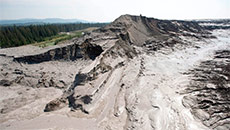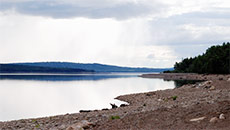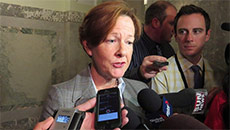OTTAWA - Sir Sam Hughes, Canada's minister of militia at the start of the First World War, was a bombastic bigot who despised Roman Catholics, French Canadians and professional military officers.
He was a man of great passions and unshakable beliefs, traits which initially endeared him to many.
But the boasting and bravado that came with those traits would eventually bring him down.
Some thought he was eccentric. Others simply called him mad.
"Many viewed him as an unstable megalomaniac, most others saw him as simply a maniac," Tim Cook, perhaps the best Canadian First World War historian of our time, wrote in his book, "Warlords."
"But he caught the frenzied tenor of the time."
Hughes was an ultra-Protestant Orangeman at a time when religion was a force in Canadian politics. He was a bare-knuckle politician whose campaigning helped win the 1911 election for Robert Borden and the Conservatives. He deeply believed that amateur, citizen-soldiers were better, brighter and more prepared to improvise solutions than hidebound professional soldiers. He was a man who saw the world in black and white, without nuances of grey.
At the outbreak of the war, the militia minister — defence minister today — threw away the existing plans for mobilizing a military force and sent out a general call to arms. He mustered his volunteers at Valcartier, Que., where a huge camp was carved out of the bush in a remarkably short time.
Hughes had his hand in everything, from appointing officers to directing hurried procurement contracts.
Despite this, or even because of this, the 1st Canadian Division was recruited, equipped (badly, for the most part) and shipped to Britain in less than three months.
As the troops embarked, Hughes tried to deliver a thrilling pep talk, a sort of "Braveheart" speech from horseback that fell flat, said Mark Humphries, who holds the Dunkley Chair in War and the Canadian Experience at Wilfrid Laurier University.
"There are lots of accounts from soldiers saying how bizarre it was to see the minister of militia on top of his horse talking about the Canadians going off to smite the Germans."
The Canadian soldiers took some dubious equipment courtesy of their minister. They were armed with the Ross rifle, a very accurate sporting weapon that wasn't robust and forgiving enough for warfare. Their leather harnesses were poorly designed. Their American-built machine guns were inferior to British models. Their boots rotted in the mud.
And then there was the MacAdam shovel, a device patented in the name of Hughes's secretary, Ena MacAdam.
The shovel was supposed to be a dual-purpose item. Soldiers could use it to dig, but they could also use it as a bulletproof shield. They could fire through the hole conveniently located in the middle of the device.
Problems? Well, it couldn't stop bullets. It weighed a hefty two kilograms. Plus, putting a hole in a shovel makes digging tricky. Hughes bought 25,000 of these items for about $34,000. They eventually fetched $1,400 as scrap.
Hughes was born Jan. 8, 1853, in Durham county in what is now Ontario. He grew up a farm boy, joined the militia at age 12 and became a schoolteacher at 16. At 33, he bought a newspaper, the Warder, in Lindsay, Ont.
In those days, newspapers wore their party affiliation as a badge and the Warder was a staunch Conservative journal. As editor and proprietor, Hughes was free to flay the Liberals and indulge his biases against Catholics and Quebec.
He eventually gravitated to politics and won a seat in the Commons in an 1892 byelection. He was re-elected seven times and died in office.
Hughes used his militia experience to win himself a staff job during the Boer War. His service was marked by several episodes of bravery and leadership. It's not clear, however, if he deserved a Victoria Cross, the highest award for valour. He thought he did and actually demanded one, to no avail.
When the Conservatives gained power in 1911, Borden named Hughes to the militia ministry.
"Hughes was a master of the patronage game, making him an invaluable ally to Sir Robert Borden," Humphries said.
"Borden seems to have genuinely liked Hughes and was willing to forgive him when he said or did things that caused problems for the government or the party, partly out of a desire to believe that Hughes would one day mature, but mostly because Borden valued loyalty above most other traits."
When war broke out in August 1914, Hughes was in his element. He raised the troops. He picked the officers. He wangled an appointment as a lieutenant-general in the British Army. He picked up a knighthood.
But the good times didn't last. Hughes's mouth often was his worst enemy.
"From the start of the Great War, Canadians came to personally identify him with the war effort itself and it is safe to say that the early years of the war were Hughes's finest hour when, at least briefly, he was universally admired by colleagues and opponents from both sides of the aisle," Humphries said.
"This began to fade as the war dragged on, casualties climbed, and Hughes's amateurish, improvised antics no longer seemed to represent the kind of war which Canadians wanted to believe they were fighting."
The Ross rifle became a symbol of Hughes's mulish personality, as he championed the rifle in the face of overwhelming evidence that it wasn't up to the job. He defended the Ross even as thousands of his soldiers threw them away in favour of British Lee-Enfields gleaned from the battlefields.
Hughes also persisted in his peacetime ways, believing patronage and cronyism were just part of doing business. But that was no longer politically acceptable as the casualty lists grew and people recognized that the war was a deadly serious struggle.
When Borden asked him to tone down his meddling, Hughes refused and began to scheme against the prime minister. That was the last straw and he was asked to step down.
Hughes stayed on in the House, scathing the Grits and anyone else who was irked by his quarrelsome personality. In a March 1919 speech in the Commons, Hughes vented his spleen against the government, then lashed out at Lt.-Gen. Sir Arthur Currie, who had commanded the Canadian Corps in the final 17 months of the war.
Currie, Hughes claimed, had needlessly sacrificed his men in pointless attacks.
It was one of Hughes's last sallies. He died Aug. 21, 1921.





